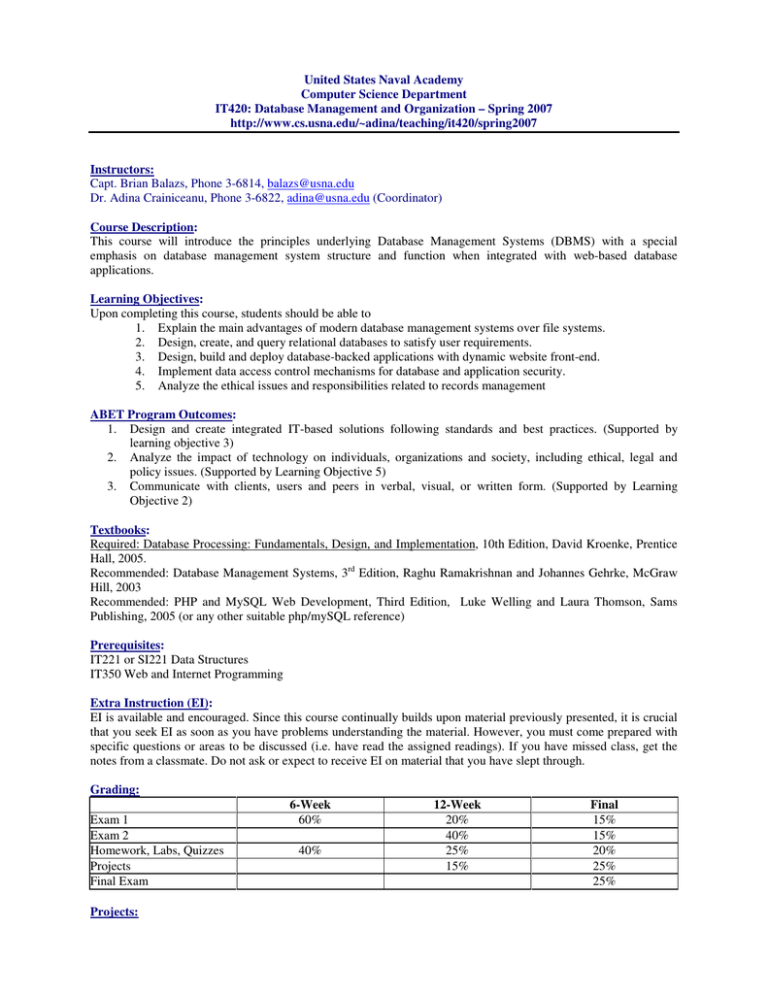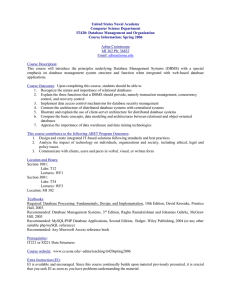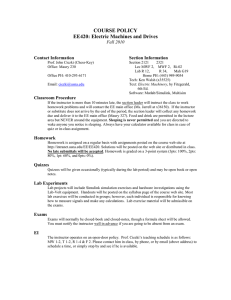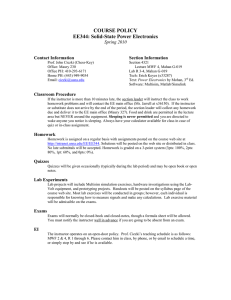United States Naval Academy Computer Science Department
advertisement

United States Naval Academy Computer Science Department IT420: Database Management and Organization – Spring 2007 http://www.cs.usna.edu/~adina/teaching/it420/spring2007 Instructors: Capt. Brian Balazs, Phone 3-6814, balazs@usna.edu Dr. Adina Crainiceanu, Phone 3-6822, adina@usna.edu (Coordinator) Course Description: This course will introduce the principles underlying Database Management Systems (DBMS) with a special emphasis on database management system structure and function when integrated with web-based database applications. Learning Objectives: Upon completing this course, students should be able to 1. Explain the main advantages of modern database management systems over file systems. 2. Design, create, and query relational databases to satisfy user requirements. 3. Design, build and deploy database-backed applications with dynamic website front-end. 4. Implement data access control mechanisms for database and application security. 5. Analyze the ethical issues and responsibilities related to records management ABET Program Outcomes: 1. Design and create integrated IT-based solutions following standards and best practices. (Supported by learning objective 3) 2. Analyze the impact of technology on individuals, organizations and society, including ethical, legal and policy issues. (Supported by Learning Objective 5) 3. Communicate with clients, users and peers in verbal, visual, or written form. (Supported by Learning Objective 2) Textbooks: Required: Database Processing: Fundamentals, Design, and Implementation, 10th Edition, David Kroenke, Prentice Hall, 2005. Recommended: Database Management Systems, 3rd Edition, Raghu Ramakrishnan and Johannes Gehrke, McGraw Hill, 2003 Recommended: PHP and MySQL Web Development, Third Edition, Luke Welling and Laura Thomson, Sams Publishing, 2005 (or any other suitable php/mySQL reference) Prerequisites: IT221 or SI221 Data Structures IT350 Web and Internet Programming Extra Instruction (EI): EI is available and encouraged. Since this course continually builds upon material previously presented, it is crucial that you seek EI as soon as you have problems understanding the material. However, you must come prepared with specific questions or areas to be discussed (i.e. have read the assigned readings). If you have missed class, get the notes from a classmate. Do not ask or expect to receive EI on material that you have slept through. Grading: Exam 1 Exam 2 Homework, Labs, Quizzes Projects Final Exam Projects: 6-Week 60% 40% 12-Week 20% 40% 25% 15% Final 15% 15% 20% 25% 25% There will be two group projects assigned throughout the semester. Projects must be completed entirely by the students making the submission. Exams: The 6 and 12-week exams will primarily focus on the recent material. The final exam will be comprehensive. If for some reason a make-up exam will be required, inform the instructor at least 1 week in advance. All exams will be closed books. You can use your own written notes during the exams. Use of any electronic devices is not permitted during the exam. Quizzes: Expect frequent quizzes. Quizzes may be open or closed book/notes, as announced. No makeup quizzes will be given. Late Assignments: Unless otherwise specified, all assignments are due before the beginning of class on the due date. If there is no class on the due day, the assignments are due at 0800, under the instructor’s office door. Assignments will normally be given on Tuesday and due the next Tuesday. Late penalty: 3n %, where n is the number of business days late. Re-grade requests have to be submitted to the instructor at most 7 days after the assignment was graded. Honor: You are expected to follow the guidance given in: • Honor Concept of the Brigade of Midshipmen, USNAINST 1610.3F • Policies Concerning Graded Academic Work, USNAINST 1531.53 • Policy Concerning Graded Academic Work, COMPSCIDEPTINST 1531.1C These references can be found at http://www.cs.usna.edu/academics/honor.htm. In particular: 1. You may collaborate on laboratory assignments to the following extent: collaborative conversations with regard to syntax, strategies and methods for accomplishing the goal of the labs are encouraged, however design and implementation must be the work of the individual student handing in the final product. Sharing or copying of any submitted work is never permitted. We reserve the right to divide the grade between any students who violate this policy. In addition, you must identify all those that you collaborate with on your assignment cover sheet. Consult your instructor if you need further clarification. 2. All work on exams/quizzes must be your own. 3. All work on the projects must be the work of the students in the team making the submission. Classroom Decorum: 1. No food is permitted in the classroom or in the labs. Drinks with closeable caps are permitted. 2. Sleeping is not allowed in class. If you feel you may fall asleep at your desk, stand in the back of the room. 3. No use of computer equipment for any purpose other than as outlined in the class activity will be tolerated, i.e. reading e-mail, playing games, or IMing classmates. These actions will subject the abuser to immediate dismissal from class to report to their Company Officer. Miscellaneous: 1. Reading assignments are expected to be completed prior to class for which it is assigned. Practical exercises will expand on concepts introduced in these readings. 2. Please inform the instructor in advance if you will miss class (for instance, due to a movement order). Submitted by: Approved by: __________________ __________________ Dr. Adina Crainiceanu Assistant Professor, Computer Science Department Dr. K. G. Schulze Chairman, Computer Science Department






